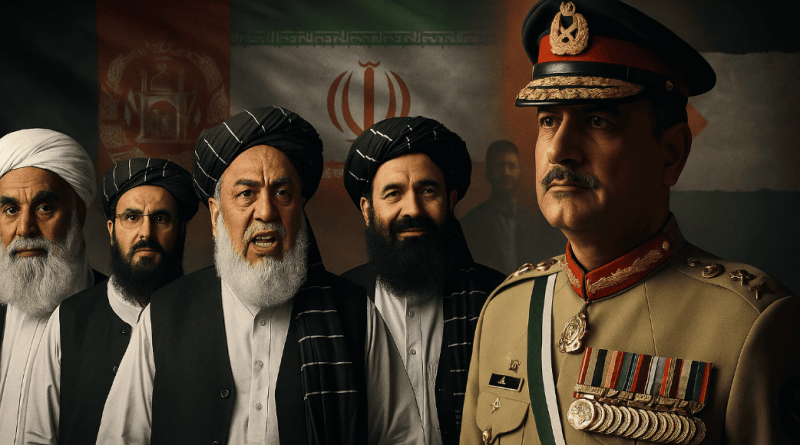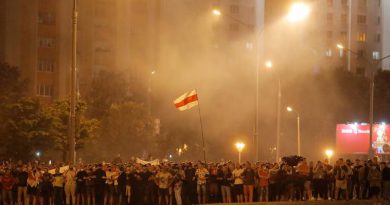OPINION: Pakistan’s Double Game on Afghanistan, Iran, and Palestine Has Hit a Dead End
This duality—preaching unity while practicing duplicity—has become Pakistan’s diplomatic hallmark.
When the Taliban stormed into Kabul in August 2021, Pakistan’s powerful intelligence chief, Lt. Gen. Faiz Hameed, appeared at the Serena Hotel and assured journalists, “Everything will be okay.”
His confident smile captured Islamabad’s belief that decades of strategic maneuvering had finally paid off. Pakistan, long accused of nurturing the Taliban, assumed it would now wield decisive influence over its western neighbor.
Four years later, those hopes have turned to ashes. The Taliban’s rise, once hailed in Islamabad as a geopolitical triumph, has become a source of profound insecurity and humiliation.
The Tehrik-i-Taliban Pakistan (TTP), emboldened by its ideological kin in Kabul, has unleashed a deadly insurgency across Pakistan’s tribal belt. Hundreds of Pakistani soldiers have been killed in cross-border raids. The Taliban, despite Pakistan’s past support, has refused to curb the TTP.
The so-called “strategic depth” has instead exposed Pakistan’s strategic shallowness. A state that once boasted of controlling its proxies now finds itself hostage to them. The illusion of regional mastery has dissolved into a grim reality: Pakistan is isolated, insecure, and rapidly losing credibility.
Weaponizing Refugees
Having failed to tame the Taliban, Pakistan turned its frustration toward Afghan civilians. In October 2023, Islamabad launched the Illegal Foreigners Repatriation Plan (IFRP), targeting nearly 1.7 million undocumented Afghans. For decades, Afghan refugees had lived, worked, and raised families in Pakistan. Suddenly, they became scapegoats for Islamabad’s security failures.
By mid-2025, more than 600,000 Afghans had been deported in what international observers described as one of South Asia’s largest forced repatriations in decades. Amnesty International and Human Rights Watch chronicled chilling stories of police harassment, arbitrary detentions, and family separations.
Pakistan justified the campaign as a counterterrorism measure, accusing Afghan refugees of harboring TTP militants. But analysts saw it differently: an act of political retribution against the Taliban regime. Kabul condemned the deportations as a breach of international law and accused Islamabad of deepening Afghanistan’s humanitarian catastrophe.
This was more than just a border dispute—it was a symptom of Pakistan’s broader malaise. A state that once prided itself on being a refuge for the oppressed had turned into a place of fear and hostility. The moral cost of Islamabad’s Afghan policy was now unmistakable.
Airstrikes and Escalation
Pakistan’s response extended beyond deportations. Under the guise of pursuing TTP sanctuaries, it began conducting airstrikes inside Afghan territory.
In April 2022, bombings in Khost and Kunar killed 47 civilians, mostly women and children. Similar attacks followed in March and December 2024, targeting Paktika and Khost. In January 2025, fresh strikes were launched along the volatile Durand Line. Over a hundred civilians have died since 2021, according to regional monitors.
Each operation fuelled anger and anti-Pakistan protests across Afghanistan. The Taliban government condemned the attacks as violations of sovereignty, accusing Pakistan of hiding its failures behind a counterterrorism narrative.
By 2025, Pakistan’s western frontier was once again aflame—only this time, without American troops to share the blame. The Afghan war that Islamabad once believed it had outsourced had come home, exacting both human and diplomatic costs.
Diplomacy as Deception
The crisis reached a symbolic peak in September 2025, when Islamabad hosted the “Towards Unity and Trust” conference under the South Asian Strategic Stability Institute.
Despite the event’s conciliatory title, the Taliban government was conspicuously excluded. Instead, the gathering featured anti-Taliban activists and politicians, turning what was billed as a dialogue into an exercise in diplomatic provocation.
Just days later, Defense Minister Khawaja Asif labeled Afghanistan an “enemy state”—a stunning reversal from Pakistan’s earlier rhetoric of “brotherhood.”
This diplomatic whiplash mirrors a deeper inconsistency at the heart of Pakistan’s foreign policy. It speaks of a nation perpetually caught between ambition and insecurity, between Islamic solidarity and realpolitik.
Even its domestic realities now echo this hypocrisy.
In early October 2025, a story broke that underscored how deeply investor confidence has eroded under the current administration. Out of 23 oil and gas exploration blocks offered for bidding, no local or foreign bids were received for 22. The only bid came from Mari Gas, and even that was for a small block with negligible output.
Taimur Saleem Khan Jhagra, Pakistan’s opposition leader, wrote “investors know this is an illegitimate govt,” saying no company—foreign or domestic—was willing to invest in a country “without rule of law.” He accused the government of driving away foreign direct investment through arbitrary governance, economic mismanagement, and political repression.
This episode is emblematic of Pakistan’s larger credibility crisis. When even domestic energy firms shy away from state-backed ventures, the problem is not market dynamics—it is a collapse of trust. The same lack of accountability that defines Pakistan’s regional duplicity now poisons its economic foundations.
The Iran Paradox and the Palestine Hypocrisy
Pakistan’s double-dealing extends far beyond its Afghan misadventure.
In June 2025, Islamabad publicly condemned U.S. airstrikes on Iran’s nuclear facilities, declaring solidarity with Tehran. Yet, only days earlier, Army Chief Gen. Asim Munir had met privately with Donald Trump, reportedly discussing “regional stability.” In a surreal twist, Pakistan went on to nominate Trump for the 2026 Nobel Peace Prize, effectively undercutting its supposed alignment with Iran.
This duality—preaching unity while practicing duplicity—has become Pakistan’s diplomatic hallmark.
The same contradictions stain its stance on Palestine. While Pakistani leaders have long professed unwavering support for the Palestinian cause, history tells another story. During Black September 1970, Brigadier Zia ul-Haq, later Pakistan’s military ruler, helped Jordan crush the Palestine Liberation Organization, a massacre that claimed thousands of lives.
In July 2025, Pakistan awarded the Nishan-e-Imtiaz to U.S. CENTCOM Commander Gen. Michael Kurilla, despite his role in coordinating American military support for Israel during its Gaza operations.
At the UN General Assembly’s 80th session, Prime Minister Shehbaz Sharif met Daniel Rosen, head of the American Jewish Congress, signaling a quiet but unmistakable outreach to pro-Israel circles.
For a country that brands itself the guardian of Muslim causes, the hypocrisy is striking. From Amman to Gaza, Pakistan’s leaders have consistently traded principle for expediency.
A Consistent Inconsistency
Across every theater—Afghanistan, Iran, Palestine, and even its own energy sector—a single pattern emerges: Pakistan’s promises collapse under the weight of its own contradictions.
It seeks influence in Kabul but alienates Afghans through bombings and deportations. It pledges brotherhood with Tehran while courting Washington. It proclaims solidarity with Palestine while decorating America’s military commanders. And now, it claims to welcome foreign investment while creating an environment so lawless that even local companies refuse to bid.
In the end, Pakistan’s gravest betrayal is not of its neighbors, but of itself. The erosion of credibility abroad mirrors the decay of governance at home. As investors flee, allies distance themselves, and insurgents advance, the message is clear: a nation that manipulates every alliance eventually stands alone.
For decades, Pakistan’s generals and politicians have built policies on the illusion of control. The Afghan gamble was meant to cement regional influence; instead, it has exposed a state adrift, distrusted by friends and foes alike.
The “everything will be okay” optimism of 2021 now rings hollow. For Pakistan, everything is decidedly not okay—and the world, finally, has stopped believing its promises.
Disclaimer: Views expressed by writers in this section are their own and do not reflect Milli Chronicle’s point-of-view.



